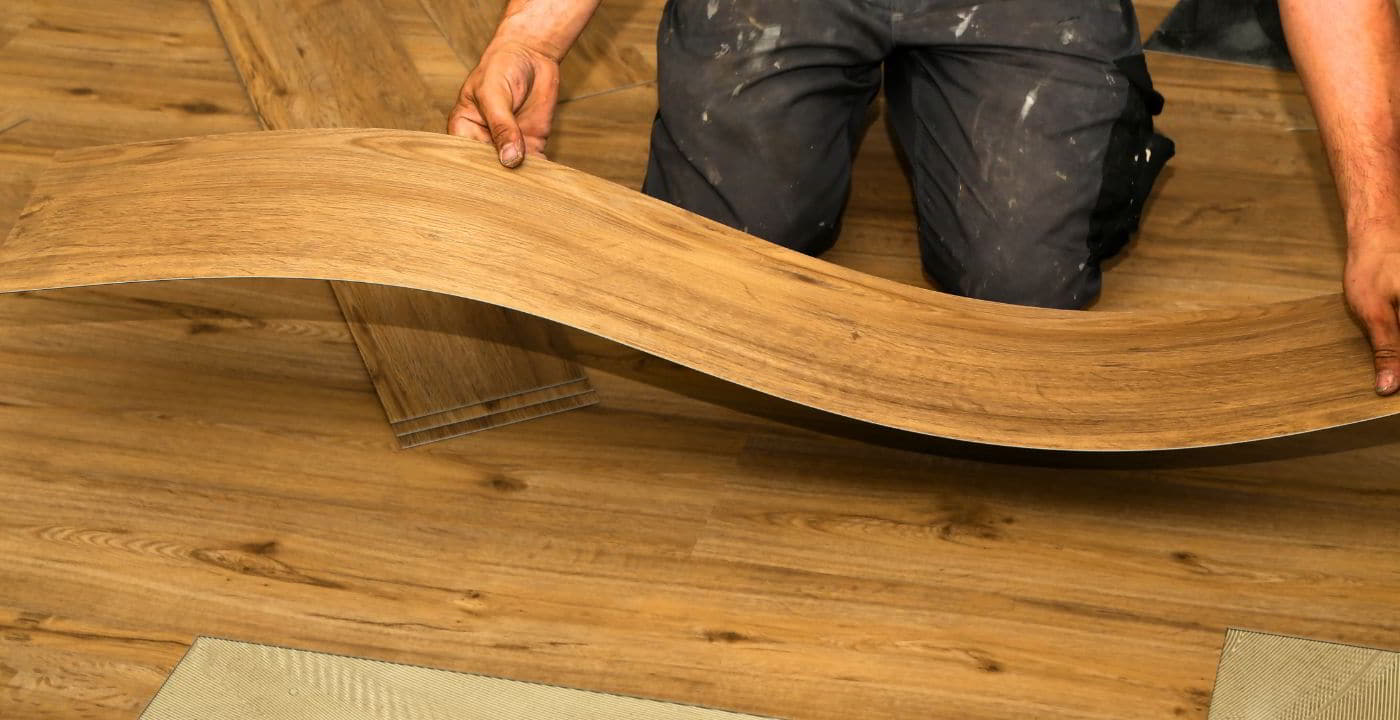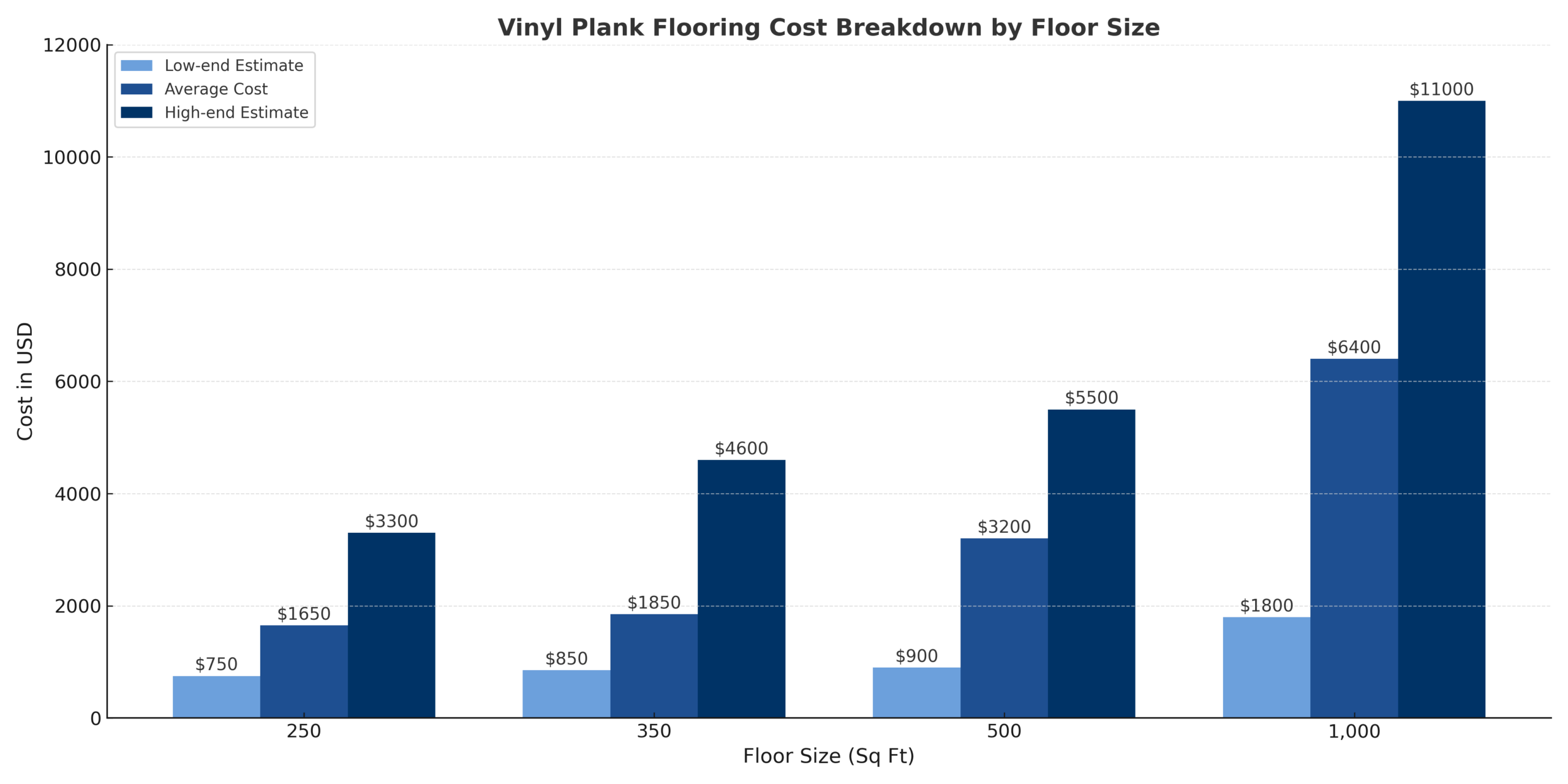
Vinyl Plank Flooring Cost Breakdown
Here is what you might spend on vinyl flooring:
| Floor Size in Sq Ft | Low-end Estimate | Average Cost | High-end Estimate |
|---|---|---|---|
| 250 | $750 | $1,650 | $3,300 |
| 350 | $850 | $1,850 | $4,600 |
| 500 | $900 | $3,200 | $5,500 |
| 1,000 | $1,800 | $6,400 | $11,000 |

Materials
Vinyl flooring is often cheaper than hardwood or tile, but prices change with different styles and qualities.
The usual cost for vinyl is $850 to $3,330, just for materials, not including installation.
Installation
After picking your vinyl flooring materials, think about installation costs.
Vinyl is simple to install with glue-down, floating, or peel-and-stick methods. Hiring a pro can give a clean look and ease your mind.
Here are the costs for vinyl installation:
| Installation Method | Average Cost per Sq Ft |
|---|---|
| Peel-and-stick | $1.50 – $8 |
| Glue-down | $2.50 – $12.50 |
| Floating/Interlocking | $3 – $13 |
Labor Costs
Labor costs are usually $1 to $3 per square foot. This varies based on installation difficulty, subfloor prep, and other services like old floor removal.
Underlayment
Underlayment isn’t always needed, but it can make vinyl flooring more comfortable, insulated, and quiet. It costs between $0.50 to $1.00 per square foot and helps even out small subfloor bumps.
Transition Strips and Trim
Transition strips and trim make a smooth change between different floors. They cost $1 to $5 per foot and come in many styles to match your vinyl flooring.
Different Types of Vinyl
There are many types of vinyl floors. Knowing the differences helps you pick the best one for your home. Here are some types:
| Vinyl Type | Average Cost per Square Foot (Materials Only) | Average Total Cost per Square Foot (Including Installation) |
|---|---|---|
| Luxury Vinyl Plank | $2 – $7 | $7 – $12 |
| Sheet Vinyl | $1 – $5 | $2.50 – $8 |
| Vinyl Tile | $2 – $6 | $3 – $10 |
Luxury Vinyl Plank (LVP)
Luxury Vinyl Plank costs between $2 and $7 per square foot. It looks like real wood due to special printing and embossing. Here’s why people like LVP:
Realistic Appearance
LVP comes in many colors and styles to look like wood, stone, or tile but costs less. Its texture feels like real wood grain.
Durability
LVP is strong and resists scratches, stains, and wear, unlike some wood floors. It’s great for busy places like kitchens and entrances.
Water Resistance
LVP is waterproof, making it perfect for wet areas like bathrooms. It’s easy to clean—just wipe spills with a cloth.
Easy Installation
LVP is easy to install with its click-and-lock system, so you can do it yourself without glue.
Sheet Vinyl
Sheet vinyl costs $1 to $5 per square foot, making it a cheap option. It comes in big rolls you can cut to fit. Here’s why people choose Sheet Vinyl:
Affordability
Sheet Vinyl is very budget-friendly, perfect for those who want to save money. It’s cheaper than wood or tile.
Wide Range of Styles
Sheet Vinyl comes in many styles and colors, looking like wood, stone, or tile, so you can match your style.
Easy Maintenance
Sheet Vinyl is easy to clean, needing just sweeping and mopping. It resists stains, good for homes with kids and pets.
Versatility
Sheet Vinyl can be put in any room, like kitchens or basements. It installs without grout lines, helping prevent water issues.
Vinyl Tile
Vinyl tile costs about the same as LVP, $2 to $6 per square foot. LVT flooring is a favorite for these reasons:
Moisture Resistant
Vinyl tile is water-resistant, great for bathrooms and kitchens. It handles spills and wetness without damage.
Durability and Low Maintenance</h4
Factors that Impact the Cost of Vinyl Flooring Installation
Before starting your vinyl flooring project, it’s important to know the factors that can impact the cost:
Vinyl Plank Thickness
Vinyl planks are between 2 and 8 mm thick. Thicker planks are usually tougher, offer better soundproofing, and feel softer to walk on, but they cost more than thinner ones.
| Thickness | Cost per Sq ft |
|---|---|
| 2 – 4 mm | $1 – $3 |
| 4.5 – 6 mm | $1.50 – $7 |
| 7 – 8.5 mm Stone | $5 – $12 |
Core Construction
Vinyl flooring usually has two core types: solid and engineered. Solid has a single vinyl core, while engineered has a mix of materials in its core.
The core you choose can affect installation costs. Solid vinyl may be pricier but often offers better durability and stability in busy areas.
Stairs
Adding vinyl flooring to stairs can be more expensive. It needs precise measuring and cutting, which takes more time than laying flooring on a flat surface.
You might also need special trim pieces and transition strips to make the stairs blend well with the rest of the floor.
Tips for Saving Money On Vinyl Flooring
Shop Around
Don’t pick the first price you get. Look at prices from different places to find the best deal.
DIY Installation
If you are good with tools, you can put in the flooring yourself to save money. Just follow the steps carefully for a nice finish.
Tools and Supplies
If you are doing a DIY job, remember to get tools and supplies. Here’s what you need:
- Utility knife
- Tape measure
- Straight edge
- Floor roller
- Adhesive applicator.
- Adhesives
- Seam tape
Opt for Off-Peak Times
Some contractors might have lower prices during slow times, so try to plan your installation then to save money.
Ready to Turn Your Vinyl Flooring Vision Into Reality?
Picking the right vinyl flooring is a big choice. Now that you know the main cost factors, you’re closer to making your space perfect. You don’t have to do it by yourself.
We’d like to help you with vinyl flooring in a free talk with one of our flooring installation experts. From picking the right vinyl to learning about installation and budgeting, our team is here to ensure you get floors you’ll love for a long time.
Reach out to us today to set up your free at-home flooring talk and check if we serve your area.
Request a consultation
Meet with one of our skilled project specialists to get started






